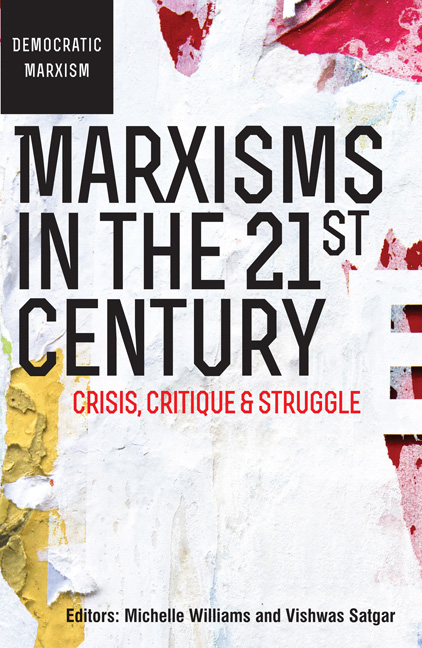Book contents
- Frontmatter
- Miscellaneous Frontmatter
- Acknowledgements
- Contents
- Acronyms and Abbreviations
- Introduction
- PART ONE DEMOCRATISING AND GLOBALISING MARXISM
- PART TWO MARXISM AND LEFT POLITICS
- Chapter 4 Notes on Critique
- Chapter 5 Marxism and Feminism: ‘Unhappy Marriage’ or Creative Partnership?
- Chapter 6 Marx and the eco-logic of fossil capitalism
- PART THREE CRISES OF MARXISM IN AFRICA AND POSSIBILITIES FOR THE FUTURE
- Conclusion
- Contributors
- Index
Chapter 4 - Notes on Critique
from PART TWO - MARXISM AND LEFT POLITICS
Published online by Cambridge University Press: 21 April 2018
- Frontmatter
- Miscellaneous Frontmatter
- Acknowledgements
- Contents
- Acronyms and Abbreviations
- Introduction
- PART ONE DEMOCRATISING AND GLOBALISING MARXISM
- PART TWO MARXISM AND LEFT POLITICS
- Chapter 4 Notes on Critique
- Chapter 5 Marxism and Feminism: ‘Unhappy Marriage’ or Creative Partnership?
- Chapter 6 Marx and the eco-logic of fossil capitalism
- PART THREE CRISES OF MARXISM IN AFRICA AND POSSIBILITIES FOR THE FUTURE
- Conclusion
- Contributors
- Index
Summary
Critique, we have recently been told, has ‘run out of steam’, making it a poor weapon for engaging in contemporary theoretical battles. Worse still, not only does critique appear blunted, even anachronistic, but the enemy is wise to the critical trick and has turned its back on ‘our’ forces. Field marshals of the academy are even calling for a regrouping, a new assessment of the strategic disposition that has come down to us via the critical tradition (see Latour 2004).
Today, even in politics, there is less patience for interventions that take a critical form (and which cannot always be dismissed as a capitulation to power). For instance, in my own experience, criticism of dominant political narratives and practices are often met with the objection: ‘Your criticisms are all very well and good, but what does it say about the alternative?’
If we (sometimes) concede the sincerity of such statements, and admit the need to direct ourselves towards finding an alternative, why should we bother with critique? ‘Write all the critical words you want,’ they might even say, ‘but it's the new world that we're really interested in.’
By presenting the problem in these terms, I do not mean to suggest that we all, and always, mean the same thing when we talk about critique or criticism. Summarising the wide spectrum of practices that go under the name ‘critique’, a recent contribution by Michael Hardt (2011: 19) speaks of ‘relatively generic means of fault-finding; methods to question the truth of authority; techniques to reveal the figures of power that operate in dominant discourses or ideologies; and even specific Kantian procedures of investigating the human understanding, reason, or judgment’. Nevertheless, for Hardt (2011: 19), in spite of the differences between ways of doing critique – conceived in his paper as the primary mode of practising theory as political intervention – they all remain open to the charge of being ‘insufficient as political methods in so far as they lack the capacity both to transform the existing structures of power and create alternative social arrangements’.
- Type
- Chapter
- Information
- Marxisms in the 21st CenturyCrisis, Critique & Struggle, pp. 84 - 115Publisher: Wits University PressPrint publication year: 2013

